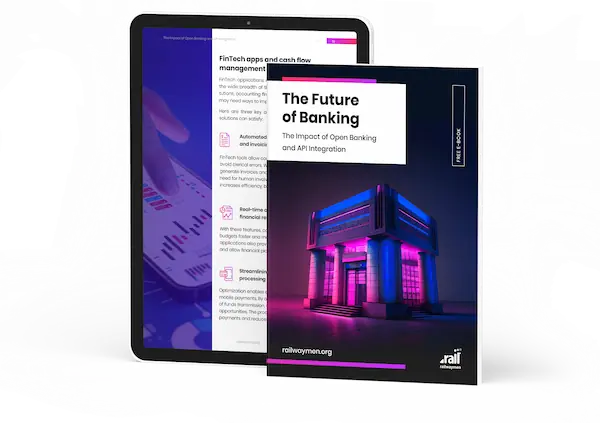The combination of the financial industry and modern technology has translated into a new reality in terms of individuals' involvement in financial transactions. Due to the rapid growth of the FinTech sector, the issue of trust plays an equally large role in the entire process. Customers should be confident that any financial data and transaction histories they share are fully secure and will not fall into the wrong hands. Therefore, I decided to take a look at the extent to which security and transparency translate into trust-building in the case of FinTech activities.
Table of Contents:
- What does transparency mean in the context of the FinTech sector?
- Security as the Foundation of Trust in FinTech.
- Transparent practices are the key to enhanced trust.
- Fostering trust in FinTech operations.
- What does the future hold for FinTech? Check out our latest e-book.
What does transparency mean in the context of the FinTech sector?
Transparency is nothing more than the clear yet open sharing of information, practices and policies. This term defines how financial companies communicate with their customers. At the same time, it reveals all the details of data handling and all kinds of financial transactions. Transparency has a very important meaning in terms of building trust. It is the established rules that define for customers what they need to do in order to make fully informed decisions. Transparency on the part of companies also contributes to the fact that subjects feel safe and secure at every stage of the process, without a shadow of a doubt about the services they use.

Transparency on the part of businesses can be communicated in many different ways. Be it information about fees, clear rules for the use of data, or providing information about the security measures used. Most important, however, is that transparency is built on mutual trust with the brand's customers.
Security as the Foundation of Trust in Fintech
A sense of security is a priority for most of us from an early age. Regardless of our age, each of us would like to feel as comfortable as possible without having to face dangers. Nevertheless, nowadays, we have to face more and more new stimuli that can affect our comfort. One such challenge is the Internet and the associated cybersecurity threats. In addition to ordinary users, it is possible to encounter hackers and cybercriminals there, who are on the lookout for mistakes on the part of FinTech companies to obtain the sensitive user data they collect. Data breaches, identity theft, phishing attacks and malware are just a few of the threats that businesses, as well as their customers, may encounter.
Therefore, the aforementioned trust between FinTech companies and users should be built from the ground up. To this end, cooperation must be two-way. Customers should be aware of their security practices, and companies should be open to feedback from the audience. Mutual exchange of experience is the first step towards building a healthy enterprise based on the prevailing realities.
To ensure that these efforts do not stop at the theoretical layer, FinTech institutions should see the security aspect as a priority. It is essential to implement robust encryption methods, secure data storage and regular security audits. Multifactor authentication, secure APIs and strong access controls further translate into a lower risk of irregularities.

Transparent practices are the key to enhanced trust
For finance companies, developing a clear, yet easily accessible privacy policy is key. It serves to notify customers about how their data is obtained, stored and shared. By accepting user consent to process personal data, FinTech companies can demonstrate a commitment to transparency and privacy.
In addition to privacy policies, it is worth mentioning the open communication channels responsible for building trust and customer engagement. The key to success is to develop customer service and messaging mechanisms that make it as easy as possible to connect with audiences through social media platforms, for example. Quickly responding to inquiries from users and providing regular updates demonstrate the company's commitment not only to transparency, but also to satisfaction derived from its approach to customers.
In addition, regular internal and external audits contribute to compliance with current industry standards. FinTech institutions should take it as a goal to establish an accountability framework and, at the same time, apply for relevant certifications so that the activities they perform are legitimate.
The use of strong authentication methods in the form of biometrics or hardware tokens affects the security of accounts held by users. Through encryption, all user data is protected from getting to unauthorized parties. In addition to encryption, frequent security audits undertaken show where FinTech companies need better reinforcements. With a precautionary approach, companies can continually develop their security systems and pay attention to the practices they undertake.

Fostering trust in FinTech operations
The exchange of experience between FinTech companies, associations of all kinds, or regulatory authorities leads to the establishment and enforcement of industry-wide transparency and security standards. The aforementioned standards are responsible for building public trust among customers and generating an environment in which companies' financial activities can have a level playing field.
Trust can be expanded on the basis of establishing partnerships with valued financial institutions. Cooperation at such a level provides customers with a sense of security and credibility. This is also the right time to lay the foundation for maintaining a secure FinTech ecosystem.
It is also worth remembering that transparency should manifest itself in the form of communication. Customers should be aware of possible risks and available security measures. Adequate customer education contributes to making sound decisions and, at the same time, informed use of services.

What does the future hold for FinTech? Check out our latest e-book!
If the above article has piqued your curiosity about the future of the FinTech industry, then I have good news for you. Right now, you can download the latest e-book from Railwaymen titled "FinTech. "The Future of Banking: The Impact of Open Banking and API Integration". It's a hefty dose of factual knowledge about banking and FinTech companies, from which you'll learn what trends will play a key role in the financial sector in the coming years. Feel free to download the e-book and share your experiences.
Do you want to know what factors are shaping the banking environment?
We have created an e-book "The Future of Banking: The Impact of Open Banking and API Integration" that provides a detailed analysis of the benefits and challenges of these adjustments. Whether you are a bank chairman or an entrepreneur, you will gain valuable information that will help you take your business to the next level with our assistance.
DOWNLOAD NOW


%20(1).jpg)



